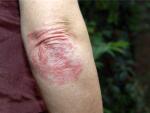
Psoriasis can be a difficult condition to manage; while its most obvious symptoms appear on the outside, the impact of the disease can greatly affect your mental health, as well.Dermatologist Francisco Tausk, MD, discusses the basics of psoriasis and what he’s learned from treating thousands of patients.
1. Q: What is plaque psoriasis?
A: Plaque psoriasis is a disease of the skin that is characterized primarily by the presence of red, purple, gray, or brown plaques, or elevated skin patches, that have an underlying red coloration and are usually covered by silver-colored or white scales. These plaques will vary in color depending on skin type. There are some areas of the body where you see it more often, such as the elbows, the knees, the scalp, the belly button, and the buttocks, but it can appear anywhere on the body.
2. Q: When you diagnose a patient with psoriasis, how do you explain the condition to him or her?
A: It’s an autoimmune disease, which means your immune system is hyperactive, creating inflammation and causing plaques to form. In most cases there is a hereditary component.
3. Q: Is treatment for psoriasis effective?
A: Psoriasis is generally very treatable, and there are many treatment options available. After evaluating my patients, if they have a mild case (for example, covering less than 10% of their body), I’ll typically start them on topical treatments like steroids and vitamin D analogues. If those don’t do the trick, I’ll move on to phototherapy, or light therapy, in which patients lie in a bed similar to a tanning bed and receive a specific type of UV ray; while it take at least two months before a patient sees results with this method, it’s very effective and safe, with few side effects.
Now, if that still doesn’t work, or if the psoriasis is severe, we turn to systemic treatments. There are old medicines that are quite effective, like methotrexate and acitretin. And there are newer systemic drugs, called biologics, that are very successful in clearing psoriasis. Most suppress the immune system, however, so there’s an increased risk of infections while taking biologics.
4. Q: Other than medications, how can patients manage their psoriasis?
A: Managing psoriasis involves some lifestyle changes. It depends on what triggers your psoriasis — and these triggers are different for every patient. However, we do see some common patterns; for example, most patients tend to flare in the winter time, due to the cold, dry air, and lack of sun exposure. Being overweight can make psoriasis worse, so I always recommend a weight loss plan and exercise if that’s an issue. And many of my patients also find they’re better able to manage their psoriasis when following a low-carb or whole plant-based diet. Many patients also flare with stress, so it’s very important for patients to learn strategies to keep stress levels down. I always suggest that patients join the National Psoriasis Foundation where they will find infinite resources for education and support.
5. Q: What tools do you recommend for your patients when they’re trying to reduce stress and manage their psoriasis?
A: I recommend that my patients practice mindfulness meditation, yoga, and exercise often. Everyone is different, so I encourage them to find a stress reduction technique that falls within their belief system. There have been several studies showing that these practices can increase the effectiveness of psoriasis treatments and overall management of the condition, so I highly recommend that patients look into them.
6. Q: What’s the future of psoriasis treatment?
A: There are a lot of new pharmaceutical advances emerging — for example, new biologics coming onto the market now have fewer side effects than previous options. As we learn more about the specific ways psoriasis works in the body, we are developing new treatments that target those actions and don’t interfere with the rest of the body’s systems as much. I think that very soon, we’ll have better medicines that will offer much more sustained relief from psoriasis. It’s incredible to see how much psoriasis treatment has changed in the last several years — there’s been so much interest because it’s possible to intervene and control the condition.





























